Head to Heart to Body to Ground
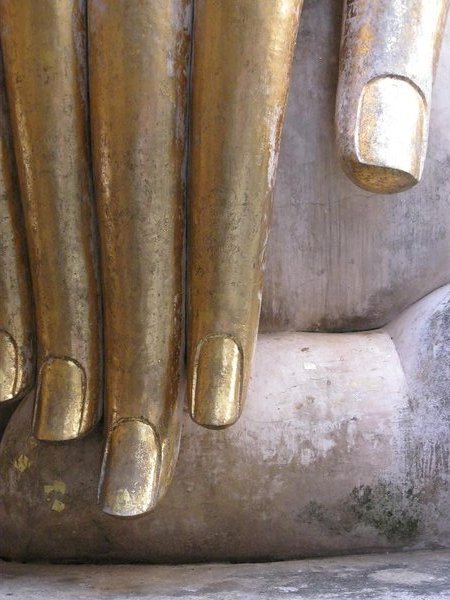 I’ve been listening to a lot of talks by Ajahn Sucitto and I’ve noticed that recently he’s been describing meditation in a way that really “grabs” me.
I’ve been listening to a lot of talks by Ajahn Sucitto and I’ve noticed that recently he’s been describing meditation in a way that really “grabs” me.
He calls it: Head to Heart to Body to Ground. It’s a way of summing up the practice of releasing afflictive mental states (anger, sadness, guilt, anxiety, etc) by transferring these concepts (from the head as thoughts: That person is such an idiot!) into emotional resonances (in the heart as feelings: I’m really angry) into somatic experiences (in the body as sensations: My jaw is tight) and then on through to the ground of awareness and acceptance (a sense that: I can let this flow through me into something bigger, more spacious, which can hold it while it plays itself out.)
It’s a great talk. Listen to it here.
W.A.I.T.
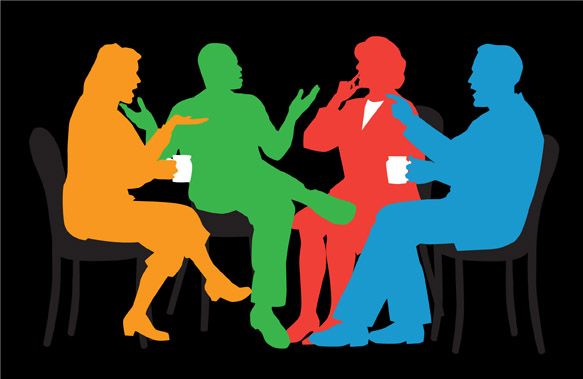 I’ve finished my jury duty! It wasn’t too bad. I spent of lot of time listening to dharma talks on my iPhone.
I’ve finished my jury duty! It wasn’t too bad. I spent of lot of time listening to dharma talks on my iPhone.
Here’s a little gem I picked up from a recent talk by Joseph Goldstein on Right Speech: Because so much of our speech is really pretty useless…. we’re not saying anything important, or helpful, or even anything particularly interesting… maybe whenever we find ourself going on and on about something, we could think of the acronym W.A.I.T. Which stands for: Why Am I Talking?
It’s Wild
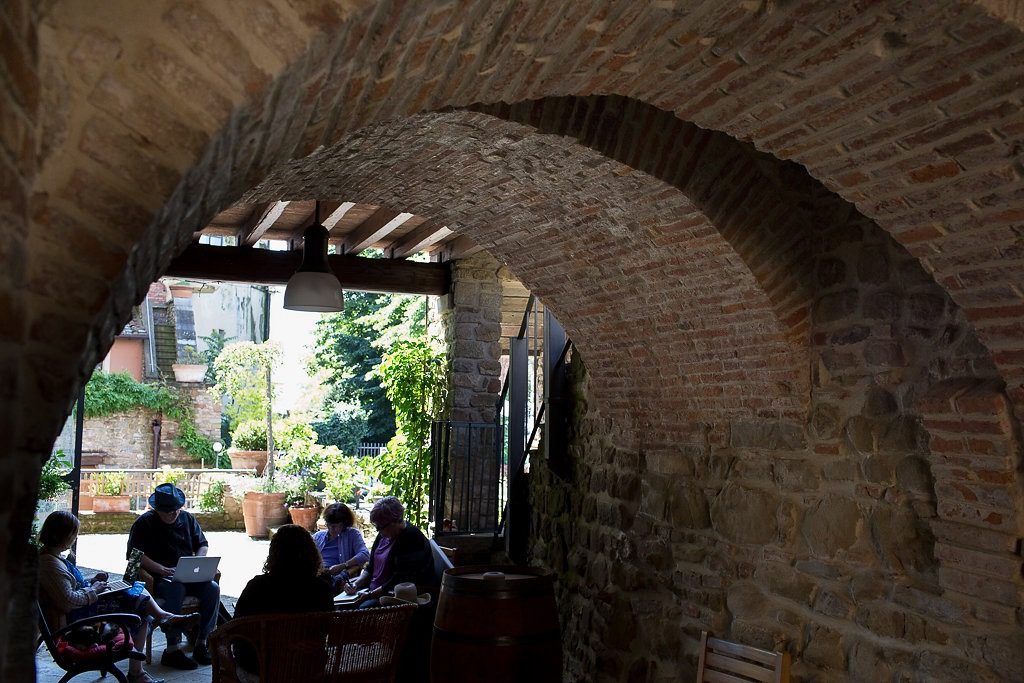 NOTE: I’m scheduled for jury duty every day next week. Last time they let me go home after the first day, which I am hoping they will do this time too. If they do, I’ll post again on Tuesday. If not, I’ll post as soon as I can. Stay tuned.
NOTE: I’m scheduled for jury duty every day next week. Last time they let me go home after the first day, which I am hoping they will do this time too. If they do, I’ll post again on Tuesday. If not, I’ll post as soon as I can. Stay tuned.
***
For today, one last prompt from the writing workshop: “Let the creative process speak.” Here’s what I wrote:
Me: I love you.
Creative Process: Thanks! I love you too.
Me: OK. Good. Now what?
Creative Process: I don’t know. I guess we move in together or something.
Me: Wait. This is too easy.
Creative Process: Sweetheart, don’t worry. We’ve done the hard stuff. We saw the bear. We let him off the chain and yeah, he broke a few chairs and tore up the wallpaper, but he settled down, didn’t he?
Me: He’s still wild.
Creative Process: Yeah. I know. I threw the chain away. I let him run off into the hills and I said it was OK if he never came back–I’d miss him, of course, but it was no good to try to keep him–and that was all he needed because he hasn’t stayed away. He doesn’t come into the house anymore, but that’s because he’s too big, the furniture doesn’t fit him, and the rug makes him itch.
So he stays in the woods with the other wild things–and he marks a trail with his claws–so I can follow him. He draws me out of the house when the moon is dark and I follow the path that’s not really a path, more of a whisper that runs through the bushes. I follow the sound like a scent, which recedes, taking me deeper and deeper into silence. Sometimes I hear a snort, or the crash when he lumbers, rears up, then drops back down to earth.
But sometimes I hear nothing. That’s when the stillness condenses, turns liquid, forms a pool that deepens and darkens until creatures who never before existed begin to rise up, shining from within, luminous, phosphorescent, shimmering and trembling with awareness.
***
(photo by Kyoko Ide)
Arriving
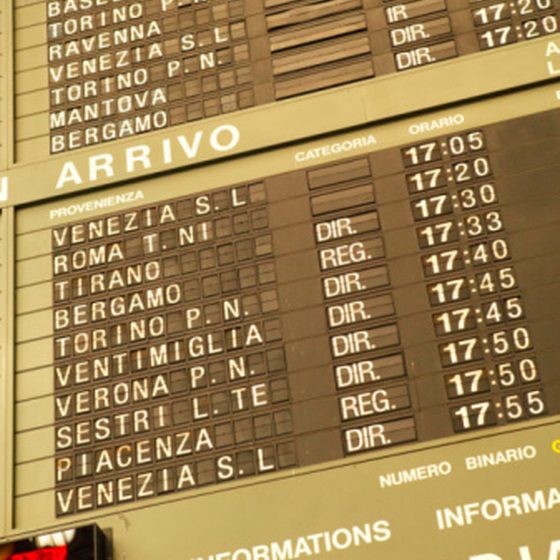 One more prompt from the workshop: “Write about arriving.”
One more prompt from the workshop: “Write about arriving.”
Here’s what I wrote:
It’s colder here than I had expected and I’m worried that I brought all the wrong clothes. I should have brought that sweater I almost packed at the last minute, it would have been perfect, not too warm, but cozy, and it was loose, a little over-sized, so I could have worn it over anything. Even that stupid t-shirt with the Nietzsche quote in Italian — geez, that’s so pretentious, what was I thinking! I’m always buying stuff like that. I see it and I think it’s so cool and I’ve got to have it, and then I get it home and it looks so stupid. Plus it doesn’t even fit! The sleeves are too tight and the neck kind of sags. Why can’t they make t-shirts that fit? They’re always bunching up, and the hems–why do the hems always roll up at the bottom like that?
“Come back the the present moment,” the instructor says.
And then I’m back.
Where is the Border?
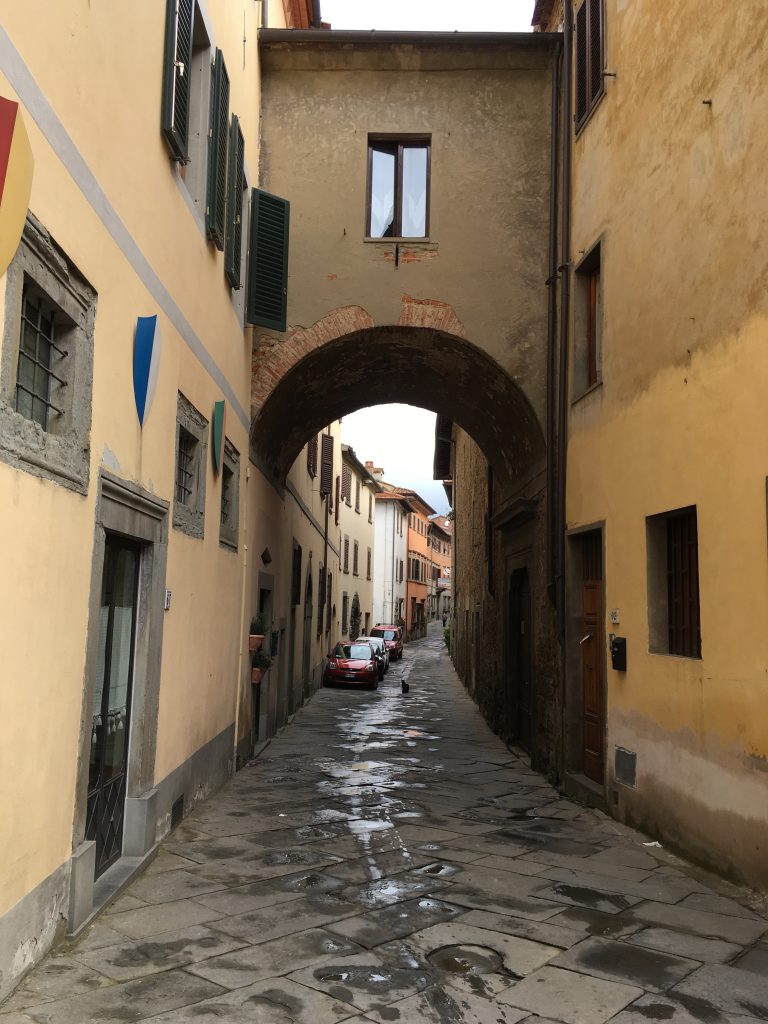 Another of the workshop prompts: “Take a walk; look around; write what you see.”
Another of the workshop prompts: “Take a walk; look around; write what you see.”
Here’s what I wrote:
The wall in the sun is warm, but the stone of the steps where I sit in the shade is cool and not exactly wet but not exactly dry either, so my thighs and my buttocks–where they rest on the stone–are becoming chilled…the warmth of my skin, of the blood rushing just below the surface, is giving itself over to the stone, is taking on the cold and the damp, an exchange no less intimate than a lingering kiss.
Is there really an “outside” and an “in”?
I don’t think so.
Where is the border between the heat of my body and the cool of the stone? Skin is porous. So is stone.
Everything is.
My pulse quickens as a car comes too close. The hairs on my arms stand erect. That car has not touched me–or maybe it has. I am changed as a result of the encounter. There are diesel fumes now in my lungs. The out-breath of combustion leaves grit on lips.
That car, too, and its driver have been touched by my presence. By the milky exhaust of my exhalation. By the dust of my skin cells I am constantly shedding. By the bite of my sweat tinged with garlic and salt.
Where is the line that marks the boundary between us? Where are the guards with their crossbars and fences?
There is no me that is not touched by you. There is no you that does not bleed into me.
***
(photo by me!)
What I’m Talking About
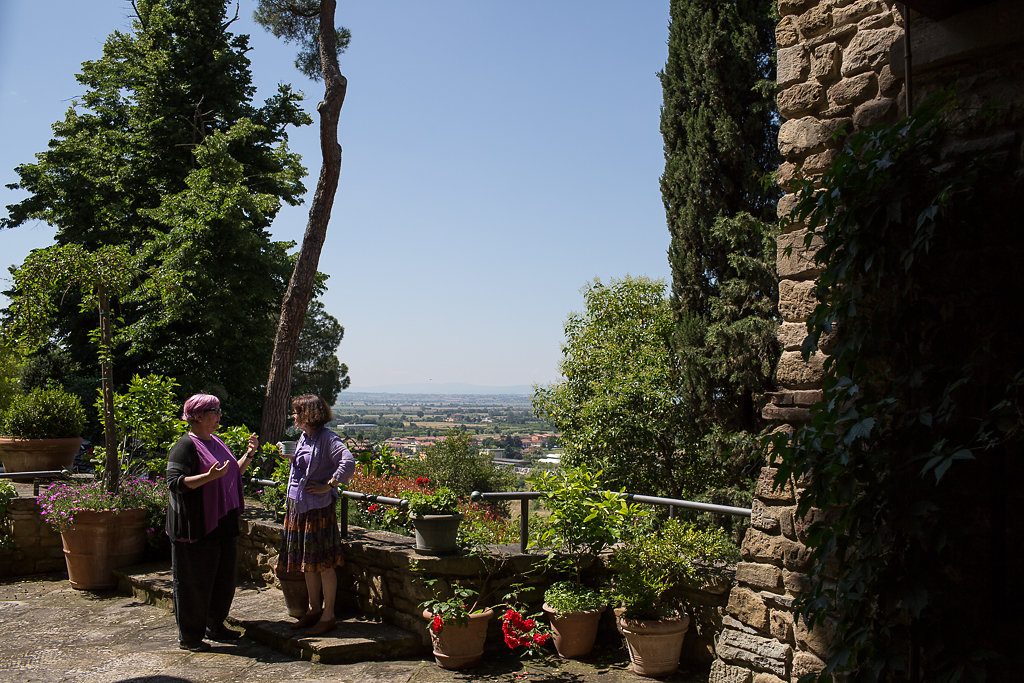 At the writing workshop there were lots of different “prompts” that we wrote from. Prompts like: “Start with the word Consequently” or “Write a dialogue between you and your ‘Muse'” or “Write a ‘Dear John’ letter using only one-syllable words.” Some of the prompts were more inspiring than others, but they were all fun.
At the writing workshop there were lots of different “prompts” that we wrote from. Prompts like: “Start with the word Consequently” or “Write a dialogue between you and your ‘Muse'” or “Write a ‘Dear John’ letter using only one-syllable words.” Some of the prompts were more inspiring than others, but they were all fun.
After a while I noticed that no matter what the prompt was, what I wrote almost always came out as some kind of Dharma talk! I’m not sure if that’s a “good” thing, but I think it says a lot about what’s on my mind…what I give my attention to…these days.
One of the prompts was: “What matters?”
Here’s what I wrote:
What matters is not the weather. Not the food. Not the language you speak. What accent. What vocabulary.
Well, OK, all of that matters in some sense. In terms of what you can or can not do. In terms of pleasant or unpleasant. Comfort. Physical ease.
But that doesn’t matter. Not really.
What matters is peace of mind.
What matters is the ability to be in any situation, any circumstances, any country or location or station in life and still be at ease.
How is this possible, you ask? Isn’t there some level of safety, of connection, of satisfaction that’s required for the mind to be at ease?
No.
Ultimately there is no security. No safety. Everything changes. There is always the unpleasant. There is always aging and sickness. And death. It is only the wanting of things to be different than they are that interferes with the peace and ease of mind I am talking about.
Pain is unpleasant. Loss is unpleasant. Disappointment is unpleasant. But it is possible to be at ease with that which is unpleasant.
It is possible.
In fact, it is necessary.
The only alternative is to always be reacting against the existence–or the possible arrival–of something unpleasant. To always be trying to hold onto whatever is pleasant–and, oh yes!, there is so much that is pleasant–but it is useless to hold on. Useless to try to have only the things that are pleasant. Useless to try to protect or defend against the loss of the pleasant.
What matters is the delight and enjoyment of whatever is pleasant, and the ability to acknowledge–to allow for the existence of–whatever is unpleasant. To respond, of course, with whatever is needed. But then to allow it all…both the pleasant and the unpleasant…to arise and pass away. As it will. As it must.
It’s only natural.
No need to fight it.
Is it not more easeful to live in accordance with that which is natural? Is there ever any use in raging against nature? Does it help to fight gravity?
So it is with the natural experience of pleasant and unpleasant. Both arise. Both pass away.
In the presence of this, there is peace.
***
(photo by Kyoko Ide)
I Come From….
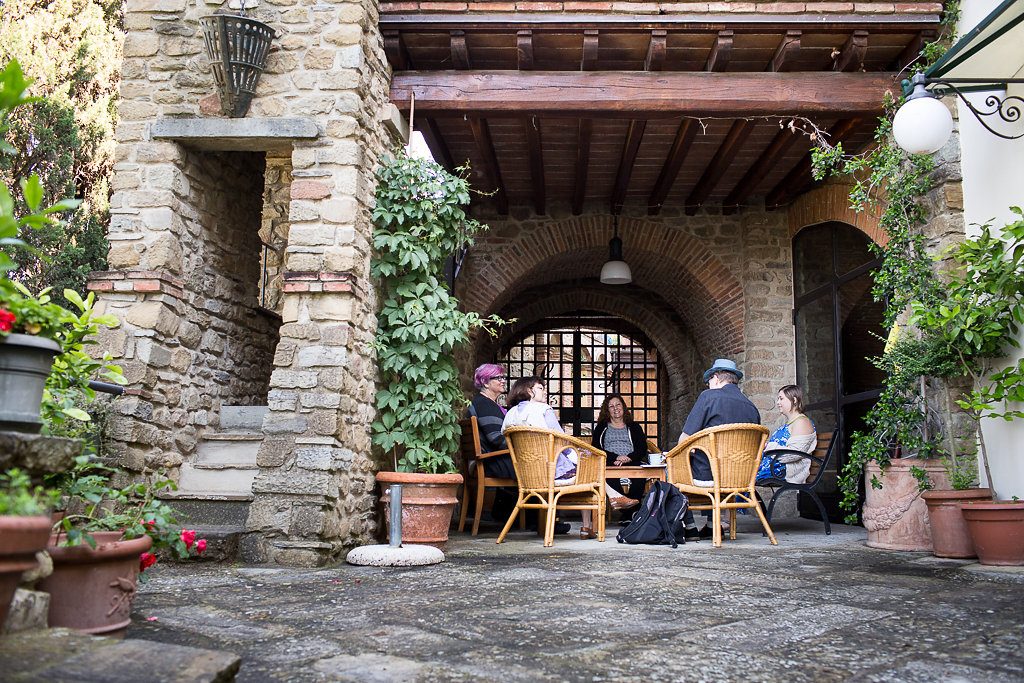 As most of you know, I’ve been at this little writing workshop in Italy, taught by a friend of mine — Cary Tennis — who now lives there. (The photo is of us at the workshop… Cary’s the one with the blue hat and I’m the one with the purple hair.)
As most of you know, I’ve been at this little writing workshop in Italy, taught by a friend of mine — Cary Tennis — who now lives there. (The photo is of us at the workshop… Cary’s the one with the blue hat and I’m the one with the purple hair.)
The workshop is really just a chance to practice writing, in a group, in a beautiful location. The way it works is the leader gives a “prompt” and then we all write whatever comes into our mind in response to that prompt…for about 20 minutes, usually…then we read what we’re written aloud to the group (or not). Then there’s another prompt and we do it all over again.
The first prompt was: Begin with “I come from….”
Here’s what I wrote:
I come from happiness. Where else could I come from and still be alive? But why did I leave? Maybe I left happiness thinking — foolishly — that happiness was too simple, too tranquil, too uninteresting to give flavor and excitement to a life.
Maybe I went looking for conflict, to try to prove myself worthy of this happiness that had been given to me, this aliveness, this thing that I had not asked for, had not worked for, had not suffered for….and so thought it was not precious enough to honor by simply receiving, simply accepting, simply enjoying!
Maybe I went looking for happiness, not recognizing that happiness was the very air I was breathing, thinking instead that I needed something denser, more substantial, something I could hold in my hand or bite down on, something I could drink or swallow, or maybe drown in.
Maybe I couldn’t taste this happiness, this birthright, because its sweetness was too subtle. Maybe sourness called out to me. Maybe bitterness, saltiness, while the sweetness waited patiently, knowingly — lovingly — for the hunger to subside.
For some, I know, there is always the hunger.
That is what sadness is. That hunger. That thirsting. That longing for a taste of something…but never knowing what that something is.
Happiness is knowing. It is breathing. It is tasting whatever there is to taste. Letting the flavor arise. Then letting it pass. As it will. As it must. And then breathing again. Living. And knowing. And breathing again.
***
(photo by Kyoko Ide)
Sneak Peek
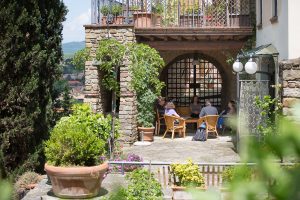 I’m back from Italy, but not quite ready to write a proper post. (It took me longer than expected to get home — one of my flights was cancelled, so I ended up spending the night in Amsterdam, and then another flight got sent back to the gate, and then there were storms, and mechanical issues, etc, etc. etc.)
I’m back from Italy, but not quite ready to write a proper post. (It took me longer than expected to get home — one of my flights was cancelled, so I ended up spending the night in Amsterdam, and then another flight got sent back to the gate, and then there were storms, and mechanical issues, etc, etc. etc.)
Anyway, I’m home now and almost ready to post. Check back on Monday. In the mean time, I leave you with this photo of the little writing workshop I was attending at Le Santucce in Castiglion Fiorention. (It was sweet!)
***
(photo by Kyoko Ide)
Traveling in Italian
 I leave tomorrow for a few weeks in Italy. I’ll be staying awhile in Florence (this photo is of the room I’ll be staying in!) and then I’ll go on to a little town about an hour away, Castiglion Fiorentino, where I’ll visit with friends, take a writing workshop, and practice speaking Italian!
I leave tomorrow for a few weeks in Italy. I’ll be staying awhile in Florence (this photo is of the room I’ll be staying in!) and then I’ll go on to a little town about an hour away, Castiglion Fiorentino, where I’ll visit with friends, take a writing workshop, and practice speaking Italian!
I won’t post again until I return, so check back sometime after June 14.
As always, before I embark on any significant journey, I consult my favorite “travel guide,” Invisible Cities, by Italo Calvino:
Cities & Names 3
For a long time Pyrrha to me was a fortified city on the slopes of a bay, with high windows and towers, enclosed like a goblet, with a central square deep as a well, with a well in its center. I had never seen it. It was one of the many cities where I had never arrived, that I conjured up, through its name: Euphrasia, Odile, Margara, Getullia. Pyrrha had its place among them, different from each of them, and like each of them, unmistakable to the mind’s eye.
The day came when my travels took me to Pyrrha. As soon as I set foot there, everything I had imagined was forgotten; Pyrrha had become what is Pyrrha; and I thought I had always known that the sea is invisible from the city, hidden behind a dune of the low, rolling coast; that the streets are long and straight; that the houses are clumped at intervals, not high, and they are separated by open lots with stacks of lumber and with sawmills; that the wind stirs the vanes of the water pumps. From that moment on the name Pyrrha has brought to my mind this view, this light, this buzzing, this air in which a yellowish dust flies: obviously the name means this and could mean nothing but this.
My mind goes on containing a great number of cities I have never seen and will never see, names that bear with them a figure or a fragment or glimmer of an imagined figure: Getullia, Odile, Euphrasia, Margara. The city high above the bay is also there still, with the square enclosing the well, but I can no longer call it by a name, nor remember how I could ever have given it a name that means something entirely different.
***
Arrivederci. Ci vediamo presto!
How Do You Need to Live?
 I’m leaving on Saturday for a few weeks in Italy, which may (or may not) be the reason I sat down this morning to listen (actually re-listen) to one of Akincano‘s talks, titled: Traveling Into One’s Life.
I’m leaving on Saturday for a few weeks in Italy, which may (or may not) be the reason I sat down this morning to listen (actually re-listen) to one of Akincano‘s talks, titled: Traveling Into One’s Life.
It’s a talk that he gave at the end of a recent retreat….a “going away talk,” which is a standard part of most retreats, where the teacher suggests ways to take the meditation practice into “daily life.”
Akincano’s take is a bit different. He says:
“If your everyday life hasn’t brought you to awakening so far, then it might not be the best idea to try to integrate your awakening practice into your everyday life. It might be better to do it the other way around….to see how much of your everyday life you can fit into your awakening practice.”
He asks:
“How do you need to live to do justice to what you have found out about yourself? About the workings of your mind. About the principles and dynamics that underpin your experience? How do you need to live in your life to do justice to that?
And:
“If you want to take responsibility…if you want to live at the edge of what you know, of what you have understood….what does that entail when you go home?”
And then:
“You don’t get insights that don’t demand something of you.”
There’s more.
It’s sobering, I will admit. But I think what he’s saying is quite important, and not usually said so directly.
Let yourself take this journey. Click here to listen. (22 minutes)
